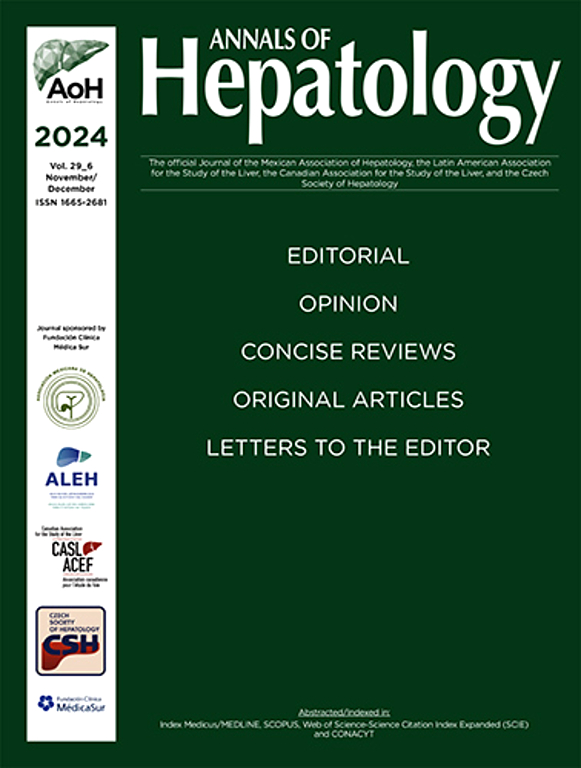Exosomal linc00152 intensifies the crosstalk between cholangiocarcinoma cells and cancer-associated fibroblasts
IF 3.7
3区 医学
Q2 GASTROENTEROLOGY & HEPATOLOGY
引用次数: 0
Abstract
Introduction and Objectives
Cholangiocarcinoma is a highly lethal carcinoma. Exosomes derived from cancer-associated fibroblasts (CAFs) serve key roles in the crosstalk between CAFs and cancer cells. Exploring the roles of CAF-derived exosomes and the mechanisms contribute to a better understanding of the development of cholangiocarcinoma.
Materials and Methods
Carcinoma and para-carcinoma tissues were collected from patients. Exosomes were isolated from CAFs and characterized by transmission electron microscopy, dynamic light scattering and western blot. Cholangiocarcinoma cells were cocultured with CAF-derived exosomes, and its proliferation, migration and invasion were evaluated with CCK-8, EdU incorporation and transwell assays, respectively. The interaction between a long non-coding RNA linc00152 and an RNA-binding protein hnRNPA2B1 was determined with RNA immunoprecipitation and RNA pull-down. The ubiquitination of hnRNPA2B1 was examined with western blot.
Results
Linc00152 was highly expressed in cholangiocarcinoma tissues and cells, and its increased expression was associated with advanced tumor stage and poor prognosis. Linc00152 was highly enriched in CAFs and CAF-derived exosomes. CAF-derived exosomes promoted cholangiocarcinoma cell proliferation, migration, and invasion by delivering linc00152. Further analysis showed that hnRNPA2B1 recruited linc00152 and enhanced its loading into exosomes. The interaction between hnRNPA2B1 and linc00152 was identified, and linc00152 repressed the proteasome-dependent degradation of hnRNPA2B1 in cholangiocarcinoma cells. The oncogenic activities of linc00152 in cholangiocarcinoma cells were dependent on hnRNPA2B1 upregulation.
Conclusions
CAF-derived exosomes harboring linc00152 enhance malignancy in cholangiocarcinoma, identifying a novel role of exosomal linc00152 for intensifying the crosstalk between CAFs and cholangiocarcinoma cells.
外泌体linc00152增强了胆管癌细胞和癌症相关成纤维细胞之间的串扰。
简介和目的:胆管癌是一种高致死率的肿瘤。源自癌症相关成纤维细胞(CAFs)的外泌体在CAFs与癌细胞之间的串扰中起关键作用。探讨caf衍生外泌体的作用及其机制有助于更好地理解胆管癌的发生发展。材料和方法:收集患者的癌组织和癌旁组织。从CAFs中分离出外泌体,并通过透射电镜、动态光散射和western blot对其进行了表征。将胆管癌细胞与ca来源的外泌体共培养,分别用CCK-8、EdU掺入和Transwell法评估其增殖、迁移和侵袭能力。长链非编码RNA linc00152与RNA结合蛋白hnRNPA2B1的相互作用通过RNA免疫沉淀和RNA拉下测定。western blot检测hnRNPA2B1的泛素化。结果:Linc00152在胆管癌组织细胞中高表达,其表达升高与肿瘤分期晚期、预后不良相关。Linc00152在caf和caf衍生外泌体中高度富集。caf来源的外泌体通过递送linc00152促进胆管癌细胞增殖、迁移和侵袭。进一步分析表明hnRNPA2B1招募linc00152并增强其外泌体的装载。发现hnRNPA2B1与linc00152之间存在相互作用,linc00152抑制胆管癌细胞中hnRNPA2B1蛋白酶体依赖性降解。linc00152在胆管癌细胞中的致癌活性依赖于hnRNPA2B1的上调。结论:含有linc00152的caf来源外泌体可增强胆管癌的恶性肿瘤,这表明外泌体linc00152在加强caf与胆管癌细胞之间的串扰中发挥了新的作用。
本文章由计算机程序翻译,如有差异,请以英文原文为准。
求助全文
约1分钟内获得全文
求助全文
来源期刊

Annals of hepatology
医学-胃肠肝病学
CiteScore
7.90
自引率
2.60%
发文量
183
审稿时长
4-8 weeks
期刊介绍:
Annals of Hepatology publishes original research on the biology and diseases of the liver in both humans and experimental models. Contributions may be submitted as regular articles. The journal also publishes concise reviews of both basic and clinical topics.
 求助内容:
求助内容: 应助结果提醒方式:
应助结果提醒方式:


